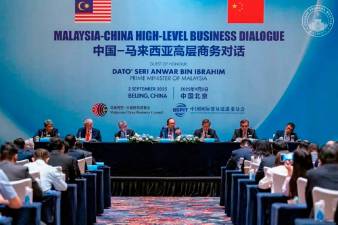BEIJING: Malaysia’s economic diplomacy received a significant boost as Prime Minister Datuk Seri Anwar Ibrahim led a high-level delegation to Beijing for strategic business discussions aimed at advancing bilateral trade and investment cooperation.
The Malaysia-China High-Level Business Dialogue, held on September 2, brought together over 120 prominent Chinese industry leaders in a strategic forum designed to accelerate Malaysia’s economic transformation under the New Industrial Master Plan 2030 (NIMP2030).
The summit was jointly organised by the Malaysia-China Business Council (MCBC) and the China Council for the Promotion of International Trade (CCPIT), creating a comprehensive platform for government and business leaders to explore new avenues of cooperation.
The Malaysian delegation featured significant ministerial representation, including the Ministers of Investment, Trade and Industry, Foreign Affairs, Home Affairs, and Transport, alongside Malaysia’s Ambassador to China. This extensive government presence underscored Malaysia’s commitment to deepening economic ties with its largest trading partner.
CCPIT chairman Ren Hongbin and MCBC chairman Senator Tan Sri Low Kian Chuan delivered keynote presentations, setting the strategic framework for discussions that would focus on industrial collaboration and supply chain integration.
The dialogue directly supported Malaysia’s New Industrial Master Plan 2030 objectives, specifically targeting the attraction of high-value investments that would strengthen supply chain resilience.
The initiative positions Malaysia as a trusted regional hub for ASEAN markets and beyond, leveraging its strategic geographic location and stable business environment.
Anwar emphasised the complementary nature of Malaysian and Chinese development strategies during his keynote address.
He highlighted mutual benefit as the cornerstone of bilateral cooperation while calling for collaborative approaches to combat rising global protectionism and unilateral trade practices.
A distinctive feature of the summit was the Prime Minister’s direct interaction with ten leading Chinese enterprises representing diverse industrial sectors.
These companies spanned critical areas including engineering and infrastructure development, energy solutions, advanced manufacturing, financial technology, digital economy initiatives, food and agriculture, cultural and creative industries, healthcare innovation, robotics, and green technology applications.
During these focused sessions, the Prime Minister personally addressed corporate concerns, actively welcomed investment proposals, and provided assurances regarding Malaysia’s commitment to facilitating smooth business operations for Chinese investors.
CCPIT chairman Ren Hongbin stressed the importance of expanding trade volumes and deepening investment relationships between both nations. His remarks focused particularly on enhancing supply chain integration, which would create more resilient and efficient cross-border business operations.
Low reinforced the organisation’s role as a crucial bridge for bilateral economic cooperation. He identified specific opportunity areas including advanced manufacturing capabilities, comprehensive digitalisation initiatives, artificial intelligence applications, and collaborative green economy projects.
The dialogue concluded with detailed discussions on major project opportunities and comprehensive industrial chain integration strategies.
Participants explored mechanisms for creating seamless connections between Malaysian and Chinese industrial capabilities, potentially leading to more sophisticated value-added manufacturing processes.
These conversations addressed practical implementation challenges while identifying specific sectors where bilateral cooperation could generate the greatest mutual benefits.
The focus on industrial integration reflects both countries’ understanding that modern economic partnerships require deep structural connections rather than surface-level trade relationships.
Both sides recognised the critical importance of maintaining stable global industrial and supply chains in an increasingly uncertain international environment. The discussions emphasised collaborative approaches to building resilience against external shocks while maintaining efficient operations across borders.
This strategic alignment addresses growing international concerns about supply chain vulnerabilities exposed during recent global disruptions.
By strengthening bilateral cooperation, both countries aim to contribute to broader regional economic stability.
The successful conclusion of the dialogue demonstrates strong momentum in Malaysia-China economic relations and reflects both nations’ determination to build sustainable, resilient partnerships oriented toward future growth opportunities.
The comprehensive nature of discussions, spanning traditional sectors like manufacturing to emerging areas such as artificial intelligence and green technology, indicates both countries’ commitment to evolving their economic relationship in line with global technological and environmental trends.
The summit represents a significant achievement in Malaysia’s economic diplomacy efforts, showcasing the country’s ability to maintain strong relationships with major economic powers while pursuing its national development objectives.
The extensive participation of Chinese industry leaders and the positive reception of Malaysian investment proposals suggest concrete opportunities for expanded bilateral cooperation in the months ahead.
This engagement style reflects Malaysia’s pragmatic approach to international economic relations, prioritising mutual benefit and practical outcomes over ideological considerations.
